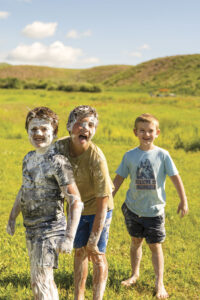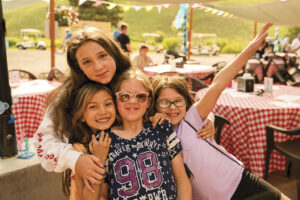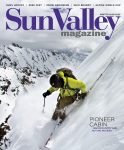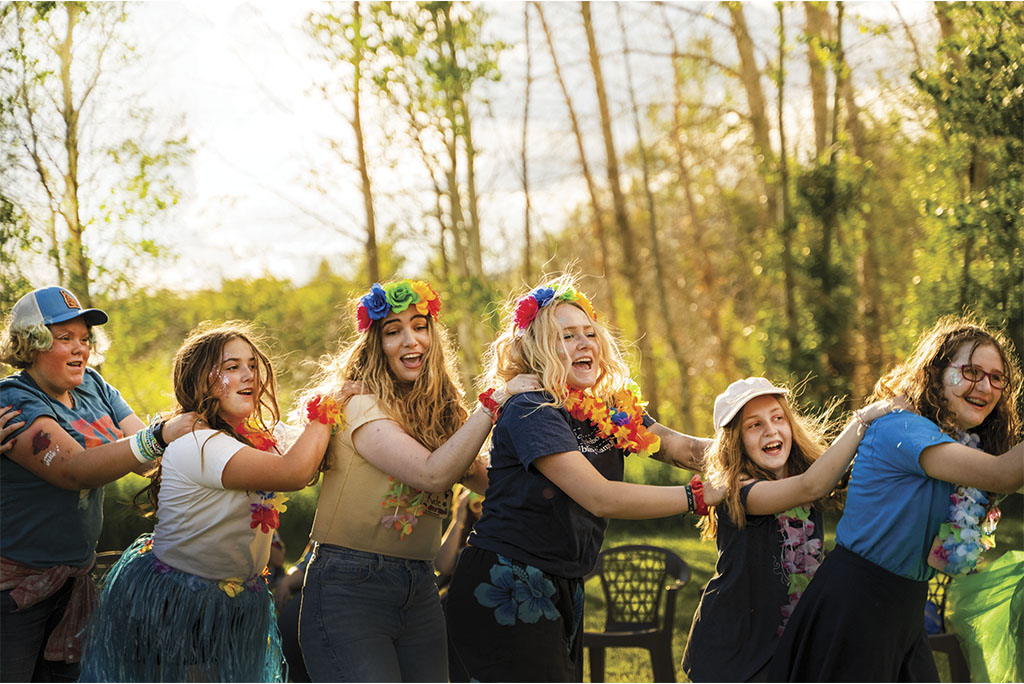Campers returning to Camp Rainbow Gold’s Hidden Paradise Camp this summer will be greeted by a new amphitheater featuring a covered stage, stadium-style and back supporting seating for 200, two large fire pits, storage for lighting and sound equipment and a mural that augments the view of the surrounding prairie and mountains.
The amphitheater was funded by Wood River Valley residents Sam Adicoff and Sue Conner in memory of their daughter Sarah. Sarah attended camp in 2006 after her cancer diagnosis, returning for the next five years as a camper and a junior counselor.
“Sarah loved camp–it’s a place where she found community with other cancer survivors who could let their guard down and talk about things they couldn’t talk about with others,” Connor says. “She especially loved the art shack and dressing in costume for the dances. From the amphitheater, campers will be able to see the hills on the other side. It’s a beautiful setting with lots of quiet space.”
Camp Rainbow Gold, the nation’s first oncology camp for children, quickly endeared itself to Wood River Valley residents when it opened at Cathedral Pines north of Ketchum in the mid-1980s. Then, the camp was not suited to children with special medical needs. Campers using wheelchairs had a tough time navigating the dirt paths, the outhouses were not conducive to children who became sick at night and there was no storage for bikes and other camp supplies.

Camp Rainbow Gold gives children hope, smiles, fun, and lifelong friendships.
“We were having to turn kids and families away when, unfortunately, cancer is not going away,” says Elizabeth Lizberg, the executive director of Camp Rainbow Gold. “The number of Idaho children with cancer is increasing, and it’s not because Idaho is growing.”
Camp Rainbow Gold began feasibility studies to figure out its future in 2007. “We didn’t have a long-term lease so we didn’t feel secure and, as an organization supported by community dollars, we felt we should be more secure,” Lizberg says.
The organization considered a property that a supporter donated near Ketchum in East Fork, but it didn’t pan out due to wildfire concerns and neighbors’ opposition.
“Treasures come out of trials because, when that was over, someone said, ‘Have you heard of Soldier Mountain golf resort?’ East Fork taught us what we needed, what a capital campaign of that magnitude was going to take. And our supporters taught us about communication and working with our donors,” Lizberg says.
The 172-acre Hidden Paradise near Fairfield, which is wrapping up its initial $16-million remodeling and construction phase, is Idaho’s only medical camp. It’s become a refuge for a growing list of organizations, including the Muscular Dystrophy Association, which use camp when Camp Rainbow Gold is not in session.
“These groups heard about the camp through media coverage of the East Fork negotiations. So, again, treasures out of trials,” Lizberg says.
Camp Rainbow Gold has been building its user base back up since the pandemic shut down camp, but it anticipates serving 600 campers and family members this summer.
Among them is Paula Shaffer’s daughter Luella, who was diagnosed with cancer of the cerebral spinal fluid that was presented as a brain tumor. Luella, now 8, had the tumor removed and underwent radiation and chemotherapy and has been in remission for more than two years.
“It was very hard on her little body, but she always had a wonderful positive attitude,” says Shaffer, who co-owns The Apothecary in Ketchum. “As a business we’ve supported Camp Rainbow Gold for 13 years and so my family used those we’d met through the organization as a support system from the moment Luella was diagnosed.”
Luella went to camp for the first time in 2023, and, like Sarah Adicoff, fell in love with crafts and dance night. Her brother Huntley attended Sibling Camp at 9, fast in warming up to the outdoor activities and camaraderie with others whose siblings had cancer. The entire family has been to Family Camp.
“Luella loved being with other kids who had experienced the things she had,” Paula says. “She was happy to be away in a safe environment where she could have support from other campers that have been through things the rest of us can’t understand. As for my son–when one child has cancer, it’s easy to forget about the siblings and how much trauma they’ve witnessed and how stressful it’s been on them. Camp makes them feel special. And we all feel a lot of energy and connectedness from Family Camp. The morning hikes with other families are so meaningful, and it’s fun as there is a lot of variation of activities.”
Camp is a work in progress. Andersen Construction just finished a 3,000-square-foot, $2.1-million medical building funded by Blue Cross of Idaho that Lizberg said is beyond anything organizers had dreamed of. It includes refrigeration for campers’ medications and a window through which nurses can hand children their meds. There’s an isolation room for children or staff who contract a stomach virus. And there are nurses’ sleeping quarters should a child need help at night. The building also includes a conference room and multiple restrooms.
Six two-floor cabins previously on the property have been remodeled with ADA-compliant ramps and bathrooms. Black Rock Homes just completed the first six of 12 new cabins, each of which can accommodate 12 people.
And Wood River Valley residents Sandor and Teri Szombathy funded a new equestrian arena dedicated to their goddaughter Devon Peterson, a Bellevue horse lover who is in remission from leukemia. When completed, the fenced arena will have a metal barn with six horse stalls and a lift to hoist riders onto horses.
The Szombathys began volunteering at Camp Rainbow Gold when it was at Cathedral Pines. “We also support Higher Ground and Swiftsure Therapeutic Ranch and, so, we were familiar with the healing power of horses,” says Sandor Szombathy. “We said, ‘Let’s build a place where horses have a place to stay when there.’”
Share Your Heart Ball, held every February at Sun Valley Resort, raised $700,000 this year with the help of such auction items as an autographed Taylor Swift guitar, Travis Kelce jersey and a flag football game headed by Sun Valley’s own Heisman Trophy winner Carson Palmer. The money funds a teen support group, provides college scholarships for campers and camp tuition.
“The good news is that, while the rate of cancer is increasing, treatment has gotten better and so we do not lose as many kids to cancer,” Lizberg says. “When I started with Camp Rainbow Gold 18 years ago, we had a memorial every year remembering two, three, four campers we’d lost over the previous year. In recent years, there were two years we did not have to have a memorial, and when we do, it’s typically one child.”
Providing camp for siblings is equally important, says Lizberg: “Brothers and sisters can have long-term psychosocial results from their sibling’s diagnosis, leading to teen pregnancies, drug abuse and even suicide. Doctors will tell you providing something like what we do for these kids is not just a nice thing to do—it’s a necessity.”

More will come as the camp looks to expand.
STILL TO COME:
Camp Rainbow Gold is embarking on an $8 million capital campaign to build a new lodge and commercial kitchen with seating for 200. The current smaller lodge and kitchen will be converted to other use. The dining room holds only 60 to 70 inside, with seating for 120 outside, so children must eat in various buildings during inclement weather.
Camp Rainbow Gold has already raised $100,00 of $600,000 needed to build a sports court and accessible playground that has already been designed to augment the existing archery and rope challenge course.
Black Rock will build six more cabins pro bono in time for the 2025 summer camping season.
Also needed is a maintenance shed.
Bicycle and walking paths will be improved once the bulk of the construction is finished.
Camp Rainbow Gold also needs to replenish its fleet of golf carts, adding some that can handle wheelchairs, to ferry some campers from site to site.
OTHER USERS:
CAMP RIVER RUN, which caters to children with uncommon disabilities, including some necessitating wheelchairs
CAMP HOPE, run by Idaho’s Epilepsy Foundation, which sent campers to Colorado until that camp ran out of room
AMP CAMP, which caters to amputees—even counselors have lost limbs
ASSISTED TALKERS, which accommodates children who use special devices to talk
JONI AND FRIENDS, which offers family camps for children with disabilities
MUSCULAR DYSTROPHY ASSOCIATION, which caters to children and adults whose ability to move has been impaired
SUNRISE RETREATS for widows
The camp can also be rented for corporate retreats, family reunions, school groups and weddings between May 1 and Oct. 31.
“Now we have a whole bunch of nonprofits working together, which means we can share resources. For instance, when we need specialized training, we can split the costs, rather than each of us arranging training individually,” Elizabeth Lizberg says.
MENTAL HEALTH BENEFITS OF CAMP FOR CHILDREN WITH CANCER
They gain self-confidence and self-esteem as they try activities that may be difficult without feeling self-conscious.
They don’t have to explain their cancer to anyone because other campers understand and support them.
They don’t have to worry about being bullied because their mind feels a little foggy or their head is shaved or they’ve lost a limb.
They feel accepted, no longer alone.


